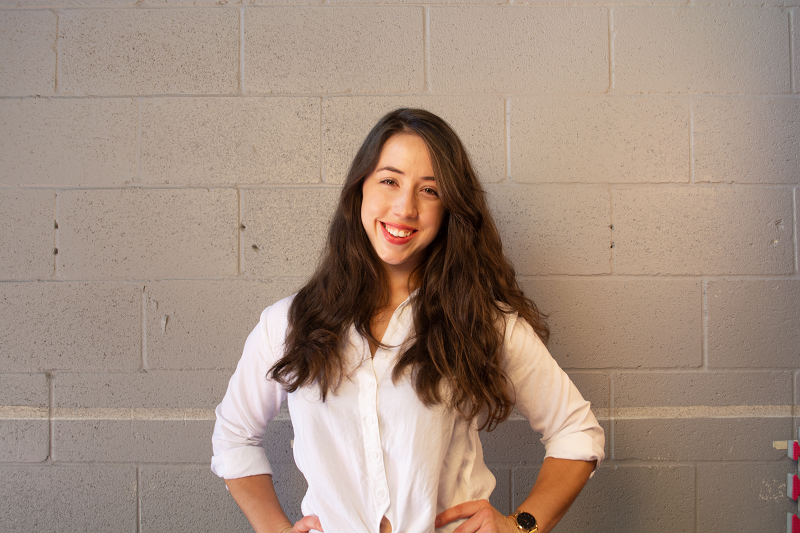Ex MMA champion and Pan Am gold medalist, Gemma Sheehan teaches girls how to fight. Yes, you read that correctly. An ex-MMA champion, Canadian Pan-Am gold medalist for Brazilian Jiu-Jitsu, and the founder of Girls Who Fight, Gemma is a fighter in every sense of the word. We caught up to talk about her journey as a fighter in a traditionally male-dominated sport, her pivot to entrepreneurship and the good fight she’s fighting now.
“As a young girl, I loved female superheroes and warriors and secretly believed that I was pretty kick-ass. As a kid I had done different extra-curriculars but didn’t really excel at any of them. I was just average but there was always something in me that wanted to shine. In 10th grade I moved across from a gym and started taking regular kick-boxing classes and working out obsessively to lose weight.” This was a time when extremely skinny, waif-like women were all over the media and the ideal aesthetic for women skewed towards thinness instead of fitness. A classmate (and crush) of Gemma’s was training at the gym with her – “I was impressed with the different classes he was taking – kickboxing, Brazilian Jiu-Jitsu and he was always giving extra effort. I admired his discipline and had a yearning to be good at something, so things just snowballed from there. One day I was taking classes at the gym and the next I was getting ready for a competitive fight. I made it my goal to be the best fighter in the MMA. The next Ronda Rousey.”

I made it my goal to be the best fighter in the MMA. The next Ronda Rousey.
Gemma went on to become the #1 ranked Ontario female MMA fighter at the age of 21. Ten years into the sport she was a top ranked Canadian competitor with 5 wins (4 in the first round) and 1 loss. In 2016, she brought home gold for Canada in Brazilian Jiu-Jitsu at the Pan- Am Games.
And then she had to stop.
“I had been getting MRIs and brain-scans for years and as a fighter you tend to take what doctors say with a grain of salt – injury is part of the game. Except if it’s a brain injury. In 2017, I found out I had white matter hyperintensities (WMH) – something typically found in senior patients or those with degenerative neurological impairment. It is also found in martial arts athletes and boxers – people who typically take trauma to the head. It was something that forced me to evaluate my life long-term and question if the drive to be excellent at something, or the money and fame from a career in fighting would be worth the risk of ending up with a debilitating neurological condition, and worse quality of life by the age of 30,” she says.
If I wasn’t Gemma the fighter, I would go back to being average, but I also knew that a career as a professional fighter wasn’t going to help anyone but myself. And I felt I could do more.
It is a stark reminder of the intense physical trauma pro-athletes endure for extremely short careers, often forgotten about once they retire from the sport. The decision to stop fighting professionally, was a painful one for Gemma – “I kept the decision to myself for a while, fearing that quitting meant I would lose all significance. If I wasn’t Gemma the fighter, I would go back to being average, but I also knew that a career as a professional fighter wasn’t going to help anyone but myself. And I felt I could do more.” That was the seed of an idea that would eventually become Girls Who Fight.
“I had an idea to create a self-defense program for young girls based on mixed-martial arts. Most gyms focus on one type of martial art, like krav maga or wen-do. Mixed-martial arts are actually more realistic than any of these extremely specialized styles of fighting because they are closest to what a fight would look like in real life,” Gemma explains. What started as a summer camp has grown into a fully-fledged empowerment program, where young girls and teens are taught skills in self-defense as well as ever-crucial life-skills – advocating for themselves and being assertive by using their voices.
Our conversation turns to Gemma’s teaching approach and how martial arts trains young girls to speak up and ask for what they want. “It is something I noticed early on. Young girls are often coddled from an early age and so they are afraid to speak up for even the simplest things. But the real-world doesn’t work that way. You need to be able to go after what you want and that’s what we try to teach girls here,” she says. Gemma further explains “I have taught both young girls and boys and it is my observation that girls tend to want to conform more. I make it a value and expectation – when you come to class, you are expected to walk in straight, tall and with assertiveness. When you’re asked a question, you are expected to speak up and answer it, instead of waiting to see what others are doing. If we are breaking up into partners, you’re expected to go over and ask someone to be your partner. As a fighter, I was never coddled by my coaches. At the gym you bring your skills and initiative to every fight, whether you’re a boy or a girl and that’s something I want to teach young girls. At Girls Who Fight, taking initiative is rewarded, instead of being someone who is always yielding to others. When parents bring their daughters to the gym, I tell them that I am going to hold their daughter to a high standard, because she has the fight in her to get what she wants,” the ex-champion says.
It is a powerful teaching philosophy and one born of her own training, where the most important skills she learned outside of proficiency in fighting is mental toughness and confidence. “Parents tell me, that they see this change in their daughters translating into how they are carrying themselves at school and on the playground so that is extremely rewarding. The goal is to provide these girls discipline, confidence and some basic self-defense skills, so when I hear that they are more confident at school or with their friends, I know we are doing something right.” It is evident that Gemma believes in personal accountability to influence outcomes in one’s life. Multiple championships, don’t happen without tremendous discipline, resilience and hard-work and this is the ultimate lesson she is trying to teach young women –whatever path they choose to pursue, they have more power to influence the outcome than they may realize, no matter the challenges in their way.
When parents bring their daughters to the gym, I tell them that I am going to hold their daughter to a high standard, because she has the fight in her to get what she wants.

“What are some of the biggest misconceptions that people have around women and girls fighting?” I ask her.
She tells me that people have told her that self-defense is a form of victim blaming. “I have had people argue that our efforts need to be geared towards teaching men not to perpetrate violence or not to harass or sexually assault women, instead of putting the onus on women to protect themselves against violence. Except I don’t know how to do that. I don’t know how to teach a society to not be violent – that’s a much bigger and broader endeavor and one that falls on our collective shoulders. But I can teach women to defend themselves against violence whether from men or other women.” It’s a realistic instead of idealistic world view and one she tells me that most parents share with her. “Ultimately, if someone attacks your daughter, you don’t care about whether the perpetrator needs to be taught not to be violent – you care about your daughter fighting to save her life.” Gemma is outcome-oriented and she wants to give women the tools to navigate the world they live in – a world that unfortunately isn’t always kind to women.
Through Girls Who Fight, Gemma has a platform to teach girls to fight for themselves. She has traveled to South Africa to teach the people of Khayelitsha self defense. She is a regular on podcasts and news features and has spoken at various corporate women’s events. For a young girl who was afraid of being average, Gemma has proven that she is anything but. As a teen she took up fighting and excelled. As a young woman, life threw her a curve ball, (or a punch) and she pivoted in a different direction. Throughout her journey she has proven that you can’t take the fight out of her – and she is on a mission to show young girls that you can’t take the fight out of them either.






